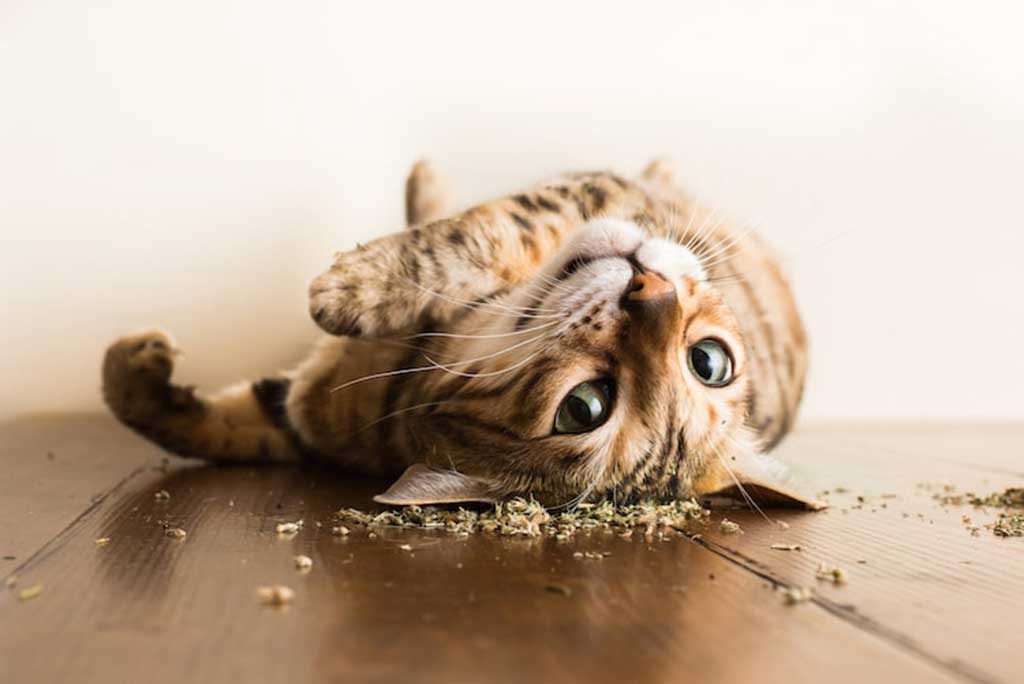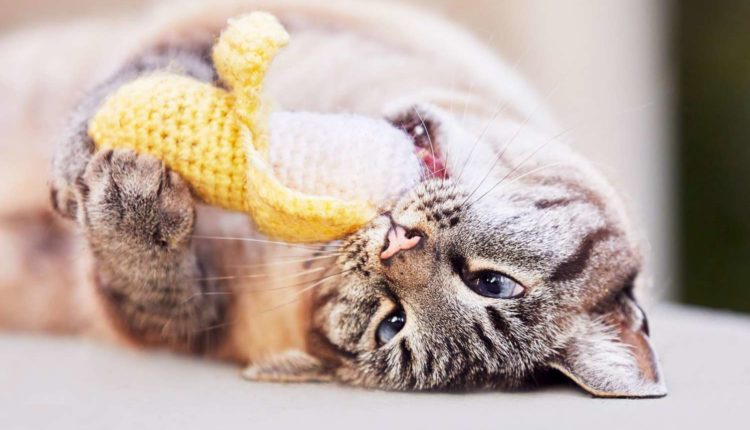What Does Catnip Do to Cats?
When your cat gets catnip she may act as though she’s FELINE fine, but catnip isn’t well-suited to every kitty.
If you’re a cat lover you’ve most likely heard of, or even witnessed, cats on catnip. Cartoons, movies, and commercials show cats with huge eyes, scruffy tails, and wild antics while they play with toys infused with catnip. With so many catnip toys on the market, it’s tempting to want to purchase every mouse-shaped catnip toy you find, just to inspire that kind of apparent bliss. But not all cats do well with catnip.
Why do our once lazy couch CATatoes become feisty felines when they encounter catnip? Researchers have tried to shed light on how catnip affects the brain, and many believe that in lots of cats, catnip creates an intoxicated feline (take away the car keys!).
What is Catnip?
Catnip is a plant, specifically an herb, that’s a member of the mint family. The underside of the leaves of the plant have glands filled with a chemical substance called nepetalactone. When a cat chews or rubs on the leaves the nepetalactone oil is released.
The catnip plant can be found in gardens or can grow naturally in areas that get good sun and moisture. You can also purchase many forms of the plant and can buy cat toys that include bags of dried catnip leaves or are catnip infused.
What Does Catnip Do to Cats And Do All Cats Love It?
Catnip affects the brain of a cat when it’s inhaled or eaten. When a cat finds catnip they may rub, roll in, chew, bite, or lick it, causing the herb to take effect, entering the brain by way of the nose. Researchers are not totally sure how catnip affects certain areas in the cat brain, though. Some research has shown that when smelled, catnip may cause certain “happy” chemical responses in some adult cats, but when it’s eaten it’s more likely to create a more tired and “mellow” kitty. This may be due to a hereditary predisposition to catnip that only some cats have. Yet, a different study suggested that all cats respond to catnip in some way. There’s still plenty of research to be done; we just don’t know yet how, and why, cats may go crazy for catnip.
Can Kittens Have Catnip?
Interestingly, research suggests that kittens and young cats may not respond to catnip until they reach maturity. This may be due to an underdeveloped vomeronasal organ, the scent analyzer, in cats. Some kittens may even find catnip unpleasant until they reach adulthood. Since kittens are already pretty active and find ways to easily entertain themselves, there’s really no need to introduce catnip at that early of an age.
Can Cats Overdose on Catnip?
As far as we know, cats cannot overdose on catnip per se but they can get sick from too much of it. Whenever we give our pets something that may affect their bodies and minds we also need to be sure it’s safe and healthy for them. Although it appears lots of cats enjoy catnip, many cat owners have found catnip causes significant issues such as vomiting and diarrhea. In some cats, catnip causes such a surge in stimulation that a cat may become aggressive towards an owner or another cat in the household.

Should You Use Catnip for Cat Enrichment?
There are lots of cat toys on the market that use catnip as a way to entice a cat to play. For a cat that tends to be less active, catnip can encourage moments of rambunctious activity. But catnip alone doesn’t make up for a lack of daily enrichment. Cats need good, quality forms of mental and physical enrichment every day, and their toys should reflect their play preferences. For instance, a cat that loves chasing something feathery or anything that moves may not be as interested in a catnip-filled toy as a cat that acts like finding a good spot on the couch equals exercise (my spirit animal).
If you do decide to use catnip, make sure you find the best quality that you can. On her website author Pam Johnson-Bennett, CBCC, says ” “When buying dried catnip, look at the packaging and try to find brands that state they use only leaves and blossoms. Companies that use lots of stems aren’t as good.”

